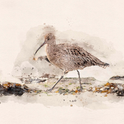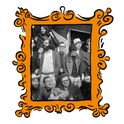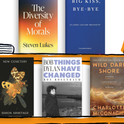(Chatto & Windus, £25)
In Search of Shakespeare by Michael Wood?
(BBC Books, £8.99)
Will in the World by Stephen Greenblatt?
(Pimlico, £8.99)
William Shakespeare was born in Stratford-upon-Avon in April 1564 to a fairly prominent local family. He died in the same town 52 years later on another April day (probably the same day). In between, he attended the local grammar school, married a pregnant woman eight years his senior, fathered a number of children, moved to London, worked as an actor in a number of theatre companies, wrote plays, speculated in tithes and property in his native and adopted towns, became part-owner of the London theatre in which he laboured longest, secured a coat of arms for his family, and achieved considerable fame and acclaim as a poet.
These are virtually the only biographical facts we may regard as incontrovertible. There are, of course, those who cast doubt on even some of these, indeed, on the one fact that renders the others of interest. But the authorship of the canonical plays is not really in serious doubt, and it is no accident that in Peter Ackroyd's new biography, as in the recent ones by Michael Wood, In Search of Shakespeare (2003), and Stephen Greenblatt, Will in the World (2004), the question is virtually ignored. Authorship may be taken as a given. Neil Armstrong walked on the moon, Sirhan Sirhan killed Bobby Kennedy, alien spacecraft did not land at Roswell, and William Shakespeare wrote the plays and poetry attributed to him.
The absence of biographical data is a daunting obstacle for anyone attempting to write about the life, but it is not in practice an insuperable one. Biographies do keep appearing. Shakespeare's prestige is so great, his reputation so enduring, that we never stop hoping to learn more. That there is nothing more to learn, at least to learn definitively, is frustrating, but it doesn't prevent scholars from writing or readers from reading. Peter Ackroyd, like Wood and Greenblatt, has pursued the most plausible strategy available: he has written a sort of social history of late Tudor and early Stuart England, concentrating on those areas that might directly relate to Shakespeare's personal experience, and has then drawn a variety of conclusions about what other likely events might have been associated with the few incontestable facts.
The detective work is necessarily imprecise, and the conclusions provisional, but the hunt offers its own rewards. Understanding the period better, we also understand Shakespeare's achievement better, and can grope towards a greater understanding of what hardships and pleasures confronted a talented young provincial making his way in the capital. This is not to suggest the three authors always arrive at identical conclusions. Greenblatt, for example, regards the Shakespeare marriage as nightmarish, whereas Wood finds the evidence ambiguous; and according to Ackroyd, "Far from being a misalliance or forced marriage, as some have suggested, the partnership of William Shakespeare and Anne Hathaway could have been an eminently sensible arrangement. He may have exercised a good deal of caution, or common sense, in his choice of lifelong partner."
Clearly these three men, for all their impressive erudition, are engaging in informed guesswork. But there are times when Ackroyd appears to forget the tenuousness of his assertions. "It is interesting," he writes, "that throughout his career he never once praised a fellow dramatist." How could Ackroyd possibly know this? We certainly know Shakespeare collaborated with several other writers at the beginning and end of his career, which can be interpreted as a form of collegial endorsement, and he was known to be on good personal terms with others. Anyone familiar with theatre folk knows how hard it is to sustain such relationships without offering a few titbits of praise, however insincerely; maybe things were different in 16th-century green rooms, but I doubt it. In a similar vein, describing New Place, the large Stratford house that Shakespeare bought in 1597, Ackroyd writes, "As a boy Shakespeare had passed it every day, on his way to school, and it impressed itself on his imagination as a most desirable residence. It represented his childhood dream of prosperity." Well, maybe. But the workings of Shakespeare's pre-adolescent mind can hardly be presented as fact.
Shakespeare's religious convictions engage all three authors; whether or not he was a recusant, an adherent of the old faith, is manifestly the controversy that most excites contemporary scholars. Unlike Claire Asquith, whose forthcoming book reportedly puts Shakespeare's putative Catholicism at the very centre of his work, Ackroyd, along with Wood and Greenblatt, is less certain. Unquestionably embedded in a network of Catholic friendships and patrons at all stages of his life, in Warwick, Lancaster, and London, and functioning in a society where religious and political questions were often one and the same, Shakespeare may indeed have been a secret Catholic himself, or he may have let himself be blown by the prevailing winds, or he may have been relatively indifferent to the whole issue. The fact that he would have proceeded with enormous caution if he were in fact a recusant helps to make the question unanswerable. What is clear, though, and what all three authors render vividly, is the terror that attended religious controversies in this period. When Pope Gregory XIII declared that the assassination of Queen Elizabeth would not be a mortal sin, he transformed a regime that was relatively tolerant about doctrinal matters into a paranoid police state. It was, to understate the case drastically, an imprudent move on the Pope's part, and certainly did his English flock no favours.
Ackroyd is illuminating about Shakespeare's practical approach to theatre. For example, he writes, "He… gave 95 per cent of the lines to the fourteen principal actors in the company; this was partly a matter of seniority, but it was also the carefully planned economy of a practical manager. It permitted rehearsals to go ahead without the presence of the hired men." And a bit further on, "The visual imagery of the play was of the utmost importance. That is why he was aware of the passage of time and daylight across the open stage, so that he wrote shadowy scenes for the hour when the shadows begin to deepen across London itself." And further still, about the tragic heroes of Shakespeare's plays and the actor who invariably performed them, "They… gradually age with Burbage."
He is good, too—as are, in different ways, Wood and Greenblatt—on Shakespeare's rustic origins. All three biographers find vocabulary and dialect in Shakespeare that no urban poet or university wit would know, along with casual familiarity with the daily minutiae of farming. In addition, he locates, as does Greenblatt, the names of various Stratford acquaintances, neighbours, and friends which have been visited upon characters in the plays. There is something likable and recognisably human about this good-humoured practice. Shakespeare's distance from us is so great, his personality so hidden, his deification so absolute, it is a pleasure to recognise something appealingly goofy about him. It is also, of course, further collateral evidence of Shakespeare's authorship, if such is needed.
Ackroyd is also excellent on Shakespeare's contemporary fame. He has found dozens of references to the man and his work penned during the poet's lifetime; most of them, except for the early and famously critical comments of Nashe and Greene, as laudatory as succeeding generations would hope and expect. Sometimes, though, he seems to overreach. Thus, in a brief discussion of Edmund Spenser's Colin Clout's Come Home Again, he finds the lines about a shepherd "Whose muse, full of high thought's invention/Doth like himself heroically sound," an allusion to Shakespeare. "What name, other than shake-speare," he demands, "does 'heroically sound'?" This is surely a stretch. Others have offered this suggestion before, but few quite so categorically.
We are never going to have a definitive Shakespeare biography. At best, there will be well-informed meditation and speculation about the life, utilising the relatively paltry information available, enriched by informed and subtle readings of the work, wide knowledge of the period and a lively, inquisitive imagination. In his new book, Peter Ackroyd brings all of these tools to bear.











